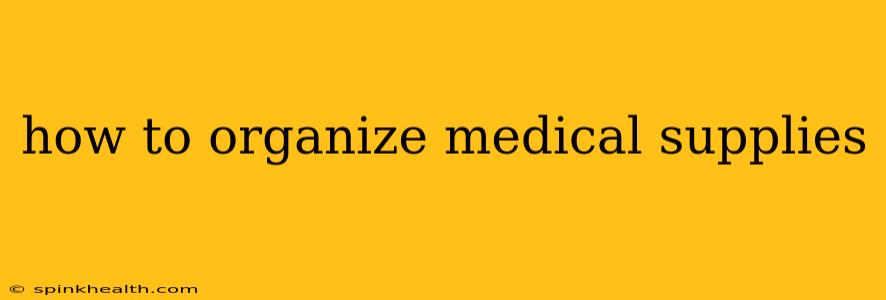How to Organize Medical Supplies: A Guide to Calm in the Chaos
Life throws curveballs, and sometimes, those curveballs land us in the hospital or needing immediate medical attention at home. Being prepared is key, but a jumbled mess of bandages, medications, and first-aid essentials can be more stressful than helpful. This isn't just about tidiness; it's about ensuring you can quickly find what you need when seconds count. Let's dive into how to organize your medical supplies for peace of mind and efficient access.
Where Should I Store My Medical Supplies?
This is the foundation of effective medical supply organization. You need a dedicated, easily accessible location. Consider these factors:
- Accessibility: The location should be easily reachable for everyone in the household, especially in emergencies. Avoid storing supplies in high cabinets or areas requiring tools to open.
- Temperature: Some medications require specific temperature ranges. Check labels carefully and store accordingly. A cool, dry place away from direct sunlight is generally ideal.
- Safety: Keep supplies out of reach of children and pets. Childproof containers are essential.
- Space: Choose a location with enough space to accommodate all your supplies in an organized manner. A dedicated cabinet, drawer, or even a clearly labeled storage bin could work perfectly.
Think of it like this: Imagine you've twisted your ankle. Do you want to be searching through a chaotic jumble of items, or do you want to swiftly grab the ice pack and bandage you need?
What Types of Medical Supplies Should I Keep on Hand?
The ideal medical supply kit varies by household needs and health conditions. However, a basic kit should include:
- First-aid essentials: Bandages (various sizes), antiseptic wipes, gauze pads, adhesive tape, pain relievers (aspirin, ibuprofen), antihistamines, antibiotic ointment.
- Medications: Prescription and over-the-counter medications you regularly use, neatly labeled and with expiration dates clearly visible.
- Emergency contact information: A list of emergency contacts, including doctors, family members, and emergency services.
- Personal health records: Copies of your medical history, allergies, and insurance information.
How Can I Organize My Medical Supplies Effectively?
Organization is key to easy access and peace of mind. Here's a practical approach:
- Categorize: Group similar items together. For instance, separate bandages, cleaning supplies, medications, and personal health documents.
- Clear containers: Use clear containers or bags to store items, allowing for easy visual identification. Label them clearly.
- Expiration dates: Regularly check expiration dates and discard expired items promptly.
- Inventory: Keep a running inventory of your supplies. This ensures you know what you have and what needs replenishing. A simple spreadsheet or notebook will suffice.
Consider using dividers within drawers or shelves for further organization. For example, you could use small boxes or compartments to hold bandages, cotton balls, and other small items.
How Often Should I Review and Replenish My Medical Supplies?
At least twice a year, take the time to review and replenish your medical supplies. This is particularly important after seasonal changes (flu season, allergy season) or when new medications are prescribed. Replacing expired items and confirming you have adequate supplies helps maintain preparedness.
How Do I Organize Medical Supplies for Different Family Members?
If you have multiple family members with specific needs, create individual or age-appropriate kits. This ensures each person has readily available medications and supplies tailored to their requirements. Clearly label each kit with the individual's name.
By following these steps, you can transform a chaotic pile of medical supplies into a well-organized, easily accessible system, providing peace of mind and preparedness for whatever life throws your way. Remember, preparedness isn't just about having the right supplies; it's about knowing where they are and being able to access them quickly when needed.

